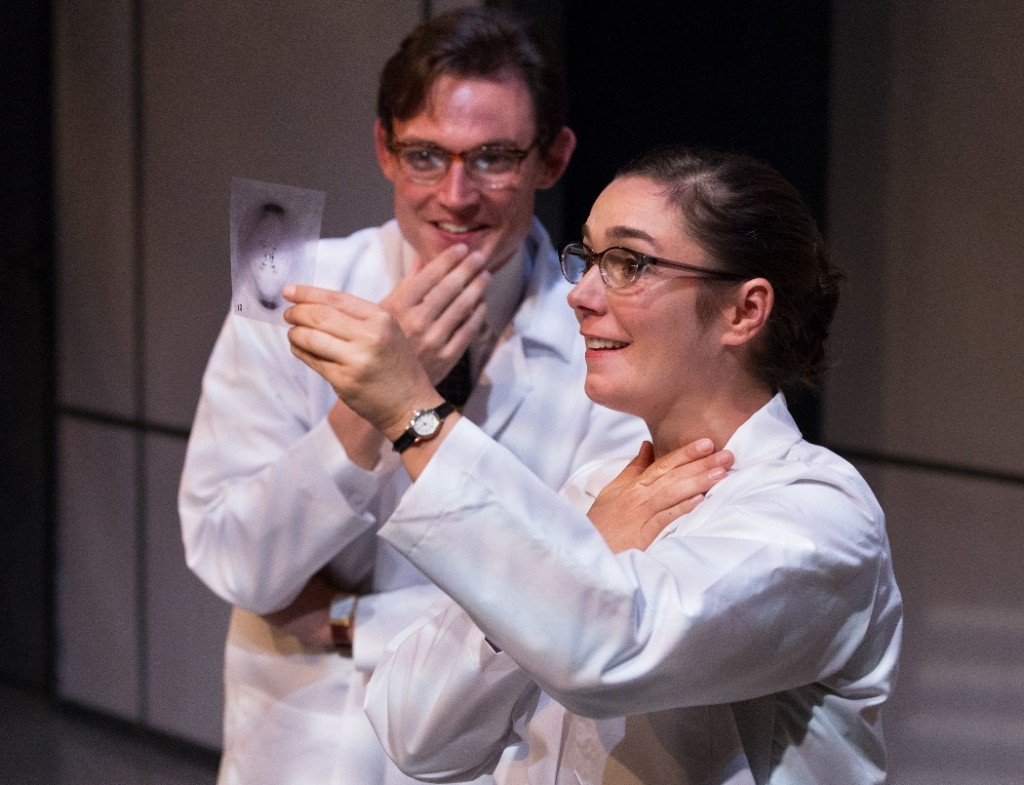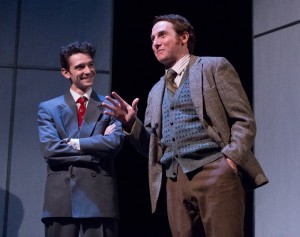
In Anna Ziegler’s compelling PHOTOGRAPH 51, now given its superb Philadelphia premiere by Lantern Theater Company, the discovery of the molecular structure of DNA is a story of sexism, antisemitism, and intellectual theft. It depicts British chemist and x-ray crystallographer Rosalind Franklin, who produced a work (“photograph 51” of the title) crucial to the breakthrough understanding of the DNA double helix. The credit for this breakthrough, and the Nobel Prize in Physiology or Medicine (1962), went to three men—James Watson, Francis Crick, and Maurice Wilkins. Franklin received little acknowledgment of her seminal role until years after her death.
Under Kathryn MacMillan’s masterful direction, the story and characters in Ziegler’s fictionalized history are engrossing, the ensemble work is flawless, and Geneviève Perrier as Franklin gives what may well be the best performance to date in her award-winning career. The multi-layered narrative moves back and forth across time as she and her male costars directly address the audience, recalling the events and then enacting the scenes leading up to and following their groundbreaking discovery.
Perrier skillfully evokes the nuances and complexity of a woman who remains self-possessed, strong, and combative while enduring the patronizing comments (she is addressed as “Miss” and not “Doctor” Franklin) and discrimination of her colleagues; of a dedicated workaholic who puts in long hours of painstaking scientific research but waxes poetic about the joys of Paris and goes missing from her British lab to enjoy hiking in the Swiss Alps; and of a logical, precise, methodical professional who dies at the age of 37—perhaps from careless exposure to the carcinogenic x-rays with which she worked—though not without realizing that “the secret of life” isn’t found solely in the structure of DNA but in the natural and artistic beauty of the world.

Joseph McGranaghan as the stiff and socially inept Wilkins (Franklin’s antagonistic associate at King’s College, London, who shows the revelatory x-ray diffraction image to Watson without her permission or knowledge), Harry Smith as the waggishly offensive Crick, and Trevor William Fayle as the competitive young success-driven Watson—determined to “win the race” at all costs—portray the men’s blind ambition, bigotry, deceitfulness, and demeaning attitude towards women. But the expert actors also display their excitement and devotion to the field, the benefits of their male bonding, joking, and collaboration, the difficulties they encountered in their private lives and relationships, and the ultimate regrets that characterize them as three-dimensional individuals working within the traditional old-boy network.
Chris Anthony and Harry Watermeier round out the excellent cast as the reverential PhD student Don Caspar and the perennial doctoral candidate Ray Gosling, adding touches of romance and humor to Franklin’s story. Meghan Jones’s stark geometric set, Shon Causer’s sharp lighting, and Janus Stefanowicz’s conventional costumes—with decorous suits and ties, tweed jackets, sweaters, and vests—effectively underscore the established structure, rules, and formality of the scientists, their workplaces, and their male-dominated era. [St. Stephen’s Theater, 10th & Ludlow streets] September 10-October 18, 2015; lanterntheater.org.
Postscript: At the beginning of the show’s run, Lantern co-founder and artistic director Charles McMahon announced a 50% salary increase for the company’s contracted casts and crews over the next four years, seeded by a generous grant from The Wyncote Foundation. Along with Ziegler’s play, it’s another welcome step in recognizing, respecting, and rewarding the work and talent of all genders and professions, not just those of men in science.

I very much was impressed by the story and production. I just started reading, “Rosalind Franklin & DNA,” by Anne Sayre to follow up.
Lantern Theater Company just announced that six performances of PHOTOGRAPH 51 have been added by popular demand. The extension runs Tuesday, October 13 through Sunday, October 18.